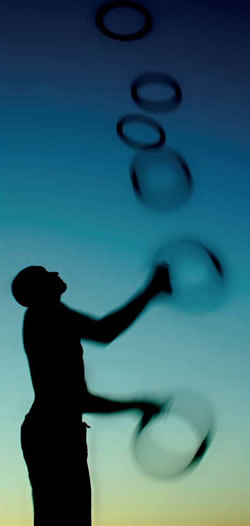Wir haben zum Ewigen keinen anderen Zugang als durch den Augenblick,
in dem wir leben. Herbert von Hoemer

Worauf konzentrieren wir uns? Auf Vergangenes, auf Künftiges? Oder auf den gegenwärtigen Moment? Es dürfte kein Zweifel bestehen, dass wir am meisten bei uns selbst sind, wenn wir aus der Gegenwart nicht abschweifen. Dann nehmen wir unseren Körper wahr, dann sind wir offen für sämtliche Geräusche, Gerüche und Eindrücke um uns herum. Dann fühlen wir. Dann sind wir erfüllt. Wir sind auch eingebettet. Wir sind – sofern wir dies annehmen können – geborgen im Hier und Jetzt, auf diesem Fleck unseres blauen Planeten im Universum. Inwiefern hat das etwas mit dem Ewigen zu tun? Nun, dieser Augenblick ist einer von unzählig vielen, die es seit Entstehen unserer Erde gab, die es auch künftig geben wird. Man kann diese Milliarden von Jahren und Erdumdrehungen eine Ewigkeit nennen.
Im Kontinuum der Menschheitsgeschichte haben wir als Individuum unseren eigenen Platz. Das darf uns mit Ehrfurcht für die ewige Lebenskette und zugleich mit Demut erfüllem. Während alles, woran wir denken, weiter nichts als Vorstellung bzw. Erinnerung ist, pulsiert das wahre Leben im jeweiligen Augenblick. Im Jetzt spüren wir es – und uns.
Quelle: @Imulse

«Wer soll das bezahlen, wer hat das bestellt? Wer hat so viel Pinke, Pinke, wer hat so viel Geld? » Jahr für Jahr liegt man sich in den Armen und singt dieses Lied. Es ist Karneval in Deutschland, viel Alkohol ist die Kehle runtergeflossen. Der Abend neigt sich dem Ende zu, das Fest ist aus. Nun heisst es auseinandergehen, und, ja, einer, einer mindestens wird die Zeche bezahlen müssen. Bevor es so weit ist, erheben sich die Gäste, sie hängen sich links und rechts bei ihren Nachbarn ein, dann singen sie fröhlich und ausgelassen von den Schulden, die beglichen werden sollen.
Das ist die sprichwörtliche deutsche Gemütlichkeit. Wenn in der kalten Jahreszeit die Vorräte knapp werden und die Kälte nicht weichen will, wird zusammengekratzt, was man noch hat, und es wird ein rauschendes Fest gefeiert. Einige Tage liegen Hinz und Kunz sich in den Armen. In der Nacht auf Aschermittwoch geht das Karnevalstreiben zu Ende. Nach dem Kehraus wird die Tristesse der langen Fastenzeit mit derselben Gelassenheit hingenommen, wie zuvor die Festfreude mitriss und begeisterte. All das geht vorbei, und es kehrt wieder. Im Tanz des Lebens.
by Carter Phipps (German translation see below)
 As I was researching my book, Evolutionaries, I made an interesting observation: This is not a world built for generalists. It is a world built for specialists. What‘s valued intellectually is specialty knowledge“”expertise on the mechanics of eukaryotic cells or the chemistry of black holes or the life cycles of ant colonies. Even within individual disciplines, the drumbeat of specialization takes precedence over broader systems of knowledge. It‘s not enough to be a physicist; one is a particle physicist or a quantum loop theorist or a string theorist. It‘s not enough to be an historian; one is an expert on Renaissance social customs or South Asian political dynamics in the eighteenth century. Indeed, the degree of specialization in our collective knowledge base is both stunning in its depth and detail and frightening in its increasing fragmentation.
As I was researching my book, Evolutionaries, I made an interesting observation: This is not a world built for generalists. It is a world built for specialists. What‘s valued intellectually is specialty knowledge“”expertise on the mechanics of eukaryotic cells or the chemistry of black holes or the life cycles of ant colonies. Even within individual disciplines, the drumbeat of specialization takes precedence over broader systems of knowledge. It‘s not enough to be a physicist; one is a particle physicist or a quantum loop theorist or a string theorist. It‘s not enough to be an historian; one is an expert on Renaissance social customs or South Asian political dynamics in the eighteenth century. Indeed, the degree of specialization in our collective knowledge base is both stunning in its depth and detail and frightening in its increasing fragmentation.
“Most educated people at the beginning of the twenty-first century consider themselves to be specialists.“ Writes Craig Eisendrath. “Yet what is needed for the task of understanding our culture‘s evolution, and of framing a new cultural paradigm, is the generalist‘s capacity to look at culture‘s many dimensions and to put together ideas from disparate sources.“
The people I have come to call “Evolutionaries“ are generalists for this very reason. Their critical insights are a result of thinking as a generalist must think“”with a passionate but broad curiosity that fans out across culture and sees connections, patterns, transitions, and trends where others only see discrete facts and details. An Evolutionary must be able to look at the movements of nature, culture, and cosmos as a whole, yet without denying the infinite detail that surrounds us.

No postures, contortions, exercises or routines – just relax, feel nice and easy with yourself. In that silence, sitting peacefully, all happens by itself, understanding arises of its own accord. When the moment is enough, there is no goal, no desire to be elsewhere, no turbulence.
Then energy has another dimension, the dimension of celebration in the moment.
Can shopping save the world? The Story of Change urges viewers to put down their credit cards and start exercising their citizen muscles to build a more sustainable, just and fulfilling world.
See for more at www.storyofstuff.org here…


